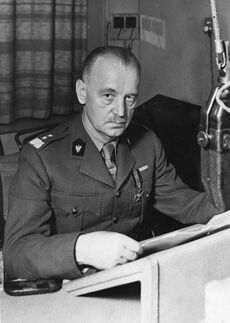Vladislav Pudovkin
This article is incomplete because it is pending further input from participants, or it is a work-in-progress by one author. Please comment on this article's talk page to share your input, comments and questions. Note: To contribute to this article, you may need to seek help from the author(s) of this page. |
His Excellency Vladislav Pudovkin | |
|---|---|
| Владислав Пудовкин | |
 Pudovkin, aged 50, preparing for his New Republic speech, shortly before he declared the ZVNP the sole ruling party of Soravian Federated Republic in 1936. | |
| 4th President of Soravia | |
| In office January 19, 1921 – October 3, 1955 | |
| Chancellor | List
|
| Preceded by | Tadeusz Czyzewski |
| Succeeded by | Gabriel Tozulyak |
| 20th and 23rd Minister-President of Soravia | |
| In office March 4, 1910 – August 26, 1912 | |
| President | Pyotr Petrovich |
| Preceded by | Tadeusz Czyzewski |
| Succeeded by | Tadeusz Czyzewski |
| In office November 7, 1915 – March 15, 1917 | |
| Preceded by | Denys Dorosh |
| Succeeded by | Kyrylo Cheban |
| Personal details | |
| Born | Vladislav Andrya Pudovkin March 22, 1886 Nimganopol, Soravia |
| Died | January 27, 1969 (aged 82) Ottseda, Belosoravian FSR, ZDR |
| Political party | Independent (1906–1921) ZVNP (1921–1969) |
| Spouse | Valyushka Kupranec |
| Children | 4 |
Vladislav Pudovkin (March 22, 1886 – January 27, 1969; aged 82), sometimes known by his agnomen "The Old Stallion" (Soravian: Старий жеребець; Staryy zherebets) was a Soravian statesman and military figure who served as President of Soravia from 1921 to 1955, and two stints as Minister-President of Soravia from 1910 to 1912 and 1915 to 1917. He was a dominant figure in domestic politics during his reign, solidifying the dominance of president over parliament, and later creating a party system of which he was a central figure. He oversaw many periods in Soravian history, including mass industrialisation, the fallout of the Great Collapse, the Great War, as well as Soravia's emergence as a superpower after the war and subsequent strained relations with Eastern Euclea.
Born into a wealthy military family in Nimganopol in 1886, Pudovkin was exposed to military culture from a young age. He attended the Parfino Military Academy in Samistopol from 1900 to 1904, joining the army afterwards, briefly full-time but in 1906 choosing only to serve part-time. He subsequently became involved in Samistopolitan politics, becoming a member of its miskrada (city council) in 1907, where he met Pyotr Petrovich. Pudovkin impressed with his charisma, and his image of a hard-working, patriotic soldier, which he kept despite his brief full-time service, found him popularity amongst the working class. Petrovich ultimately selected him for the minister-presidency in 1910, but resigned in 1912 following disagreements over proactive foreign policy. Tadeusz Czyzewski appointed him in 1915, but disagreements over economic policy saw him resign once again in 1917.
Pudovkin's resignations allowed him to escape criticism for the controversial policies of the Great Collapse, and he later successfully won the presidency in 1921, utilising his popularity amongst the working class, as well as hardliner members of the government. His party apparatus in the ZVNP also indicated a move away from political non-partisanism, which became associated with unaccountability of higher figures. He spearheaded economic recovery and the war effort, eventually being boosted by Allied victory and Soravia's newfound geopolitical status amongst Euclean nations. In 1936, he launched massive reforms to Soravia's political system, establishing the Soravian Nationalist and Revivalist Party as Soravia's sole legal party, modelling it as a popular front, increasing the powers of the presidency and essentially placing the legislature under his control. Economic growth and post-war euphoria put his popularity at an all-time high during this period, but was quickly undermined by the Miersan General Strike and the Godfredson Plan, which strained relations between Soravia and the East, particularly Estmere.
In the 1940s, Soravian participation in the Solarian War greatly dented his political image, which he had moulded into one of efficiency and robyty rechi – "get things done". The particularly bloody Amathian campaign especially brought him negative spotlight, though his opposition mainly operated underground until the final years of his presidency. Growing party opposition to Pudovkin, who became increasingly paranoid of plots to dethrone him, began to stifle government processions. Cabinet members were often appointed and fired on a whim, but his protégé Gabriel Tozulyak eventually brought stability to the government, positioning himself to succeed him. Pudovkin appointed Tozulyak in his resignation speech in 1955, aged 68. He continued on as a member of the ZVNP, though mainly honourary in practice, until his death in 1969.
One of both Soravia and Euclea's most important figures of the 20th century, Pudovkin greatly affected Euclean geopolitics with his strongman rule. The influence of his personality and personal relations in Soravia's domestic policies and foreign relations has been the subject of study by political scientists and psychologists for decades. His usurpation of the legislature and widespread undemocratic reforms, instigated through a self-coup, influenced the rises to power of other dictators around the world. In the 1930s and 1940s, he formed a great personality cult, which, in wake of the war, bolstered his popularity, but this quickly deteriorated in the late-40s and early-50s. Hundreds of monuments, streets and statues are dedicated to Pudovkin throughout Soravia and its former territories, where he is still lauded for projecting Soravian influence, his wartime victories and post-war economic growth. Elsewhere, he is often criticsed for his militarism, autocratic nature and creation of a one-party state.